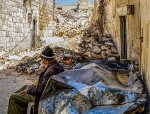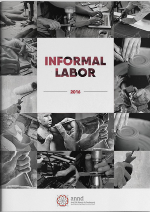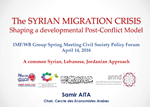Syrian Arab Republic
Published on Thu, 2017-06-01 00:00
The Social Degradation Report explores the impact of the armed conflict in Syria on social relations. It uses the concept of social capital as an approach to analyse trust, cooperation, and shared values.
Direct violence –including displacement, involvement in violent acts, and discriminatory institutional practices– affects both bridging and linking social capitals. Development indicators such as health, education, and employment are strongly correlated with the shared values and attitudes component. While these indicators are not directly related to violence, they affect the cognitive aspect of a shared vision for the community and the country, and are important factors in building the future social contract. Moreover, the research shows that conflict economy and conflict-related deaths are the main determinants of feeling secured, while the trust between individuals is affected by conflict economy, discriminatory institutions, forced displacement, and loss of job opportunities.
The Syrian Centre for Policy Research (SCPR) launched its report “Social Degradation in Syria” in cooperation with the Issam Fares Institute for Public Policy and International Affairs (IFI) at the American University of Beirut (AUB) on June 1st.
|
Published on Fri, 2017-05-12 15:43
“Informal labor is not a marginal issue in Arab countries. It is a core component of modern Arab economies and the distribution of work therein and is doomed to expand under current policies,” explained Samir Aita, lead researcher of the Arab NGO Network on Development (ANND) at the launch of the 2017 edition of the Arab Watch on Economic and Social Rights, last May 8 in Beirut.
The report, launched publicly at the American University, concludes that the “highest percentages of lack of formality are in countries with the least strict laws and bureaucracies, and vice versa. This goes against the stereotype that says that informality is a result of strict laws and bureaucracies.” It also concludes that “informal labor in Arab countries is mostly waged labor, except in rare cases, which contradicts another idea that says that informal labor is a choice, as young people entering the job market have no choice but to find any type of livelihood, no matter how fragile or temporary.”
|
Published on Thu, 2016-09-01 19:01
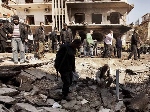 |
After more than five years, the conflict in Syria represents a catastrophic failure of the “international system” in terms of maintaining basic human rights (including the right to live), peace and stability. This system, including the UN as well as influential world states and organizations, has failed to reduce the escalation of conflict, let alone create effective mediation processes to reach a decent solution. Furthermore, many international and regional actors have fueled the conflict by providing political, military, logistic and financial support to the warring parties, investing in identity politics to deepen polarization and strengthening hostility and a spirit of revenge in their local affiliates. The conflict has largely destroyed Syria’s economic structure, foundations and institutions, severely depleting resources and capital, human capital, social capital and economic governance. Economic priorities shifted as all subjugating powers reallocated resources to fuel violence and its related activities. This economic environment came along with the absence of rule of law, property rights, and accountability, in addition to a surge in corruption. It generated new actors and/or changed the behaviour of previous actors to be part of new rules of game: that of imposing hegemony by force and building new political economies to sustain the conflict. Effectiveness and equity, as goals of economic policy, have been diminished as the authorities sacrificed the core development goals and achievements to serve the new “development in reverse” dynamics.
|
|
After more than five years, the conflict in Syria represents a catastrophic failure of the “international system” in terms of maintaining basic human rights (including the right to live), peace and stability. This system, including the UN as well as influential world states and organizations, has failed to reduce the escalation of conflict, let alone create effective mediation processes to reach a decent solution. Furthermore, many international and regional actors have fueled the conflict by providing political, military, logistic and financial support to the warring parties, investing in identity politics to deepen polarization and strengthening hostility and a spirit of revenge in their local affiliates. The conflict has largely destroyed Syria’s economic structure, foundations and institutions, severely depleting resources and capital, human capital, social capital and economic governance. Economic priorities shifted as all subjugating powers reallocated resources to fuel violence and its related activities. This economic environment came along with the absence of rule of law, property rights, and accountability, in addition to a surge in corruption. It generated new actors and/or changed the behaviour of previous actors to be part of new rules of game: that of imposing hegemony by force and building new political economies to sustain the conflict. Effectiveness and equity, as goals of economic policy, have been diminished as the authorities sacrificed the core development goals and achievements to serve the new “development in reverse” dynamics.
|
Published on Fri, 2016-04-22 12:15
This paper discusses the newly issued World Bank report on the welfare of the Syrian refugees in Lebanon and Jordan, based on the analysis of UNHCR data. It points some significant aspects not addressed, especially the effects Syrian pre-crisis public policies. It highlights the gap between the lack of proper socioeconomic assessment of both refugees’ and hosting communities and the fact that resilience and integration policies are already been negotiated with the Lebanese and Jordanian governments. This is while there no such efforts dealing with Egypt, Iraq and mainly Turkey, who are receiving large numbers of refugees. In addition, the Civil Society organizations are channeling a large share of the humanitarian aid, while they have, as well as the Syrian refugees’ and hosting communities, no proper voice in the debate.
|
Published on Tue, 2014-12-23 09:28
For the fourth successive year, a delegation of human rights and development civil society organizations from the Arab region will be visiting the European institutions in Brussels between the 8th and the 12th of December 2014. The Arab delegation includes civil society representatives from Egypt, Jordan, Palestine, Morocco, Syria, Tunisia and Lebanon.
This visit seeks to provide a platform for dialogue and exchange between civil society organizations from the Arab region and European policy makers at the Parliament and Commission around the EU’s support and involvement in the region.
|
Published on Mon, 2012-03-26 11:21

Members of Syrian security forces.
(Photo: FreedomHouse2/Flickr/CC)
|
The use of military action is intensifying in Syria, and the human rights and humanitarian conditions are deteriorating, warned the Arab NGO Network for Development (ANND) and the World Alliance for Citizen Participation (CIVICUS) in a joint statement. Despite the calls of Office of the High Commissioner for Human Rights, the Arab League and a UN special envoy, Syrian authorities have failed to halt the use of excessive force and violence, according to these organizations.
|
Published on Thu, 2011-09-15 10:01
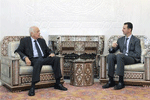
Nabil el-Araby, head of the League,
with Syrian President Bashar
al-Assad last Saturday.
(Photo: Government of Syria)
|
Source: International Federation of Human Rights
More than 170 national, regional and international civil society organizations sent an open letter to Dr. Nabil El Araby, Secretary General of the League of Arab States, urging the bloc to put pressure on Syria’s government to effectively end the crackdown on peaceful opposition, release all political prisoners and provide compensation for victims.
|
Published on Wed, 2011-06-22 07:36
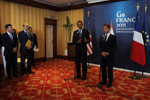
Press conference at the last G8
Summit. (Photo:L. Blevennec/
Presidency of France)
|
Source: The New Indian Express
While the G20, that includes the rich countries and the emerging ones, is getting more and more relevance, the Arab unrest and the developments in Libya and Syria have given a new meaning and purpose to the Group of Eight (G8) most powerful nations, according to Himanshu Jha, National Coordinator of Social Watch India. In a column published by The New Indian Express newspaper, Jha said that the G20 seems to have "turned into a hotbed of global decision-making" in charge of "the traditional economic agenda".
|
SUSCRIBE TO OUR NEWSLETTER
Submit

|

